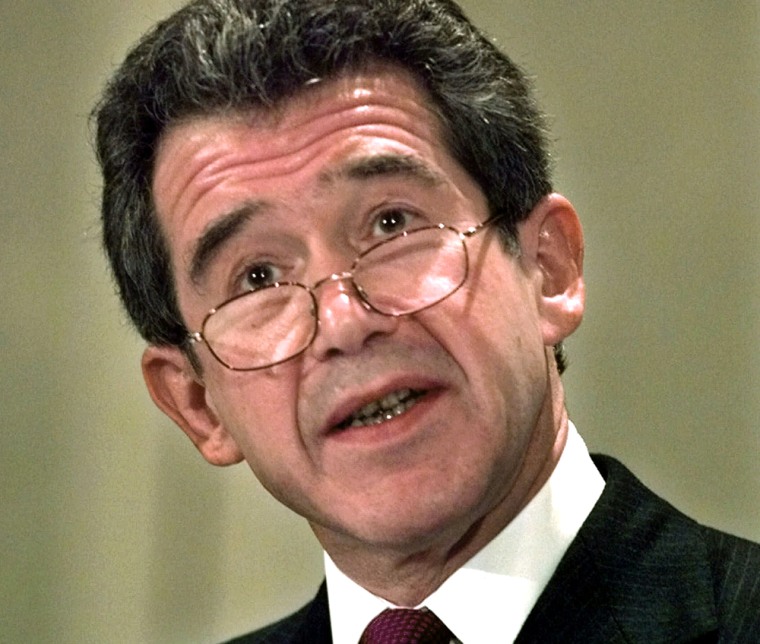It wasn’t the deaths of 15 workers at BP’s Texas City plant that brought the company’s chief executive down. Nor was it one of the largest North Slope oil spills ever at the British company’s Prudhoe Bay, Alaska operations.
John Browne, the man who turned BP PLC into one of the world’s top energy companies, fell from grace after admitting he lied to a judge when he tried to block a newspaper from printing allegations of wrongdoing made by a former boyfriend.
The admission may have been the last straw after a series of troubles at the end of a storied career. But to some, Browne’s resignation as chief executive Tuesday illustrates the power of Britain’s tabloid press — and the perils of being gay in the conservative world of big oil.
Stephen Coote, director of Britain’s Gay Business Association, said “sport and business are the two last bastions” of institutional homophobia.
Browne, one of Britain’s most powerful businessmen and a close associate of Prime Minister Tony Blair, resigned Tuesday after acknowledging that he lied during legal action to block the Mail on Sunday newspaper from publishing an interview with a former lover, Jeff Chevalier.
Browne, 59, told the judge that he and Chevalier, a Canadian reportedly in his 20s, had met by chance in a London park. British media outlets reported that they met through an escort service Web site.
In a statement, Browne admitted he lied to the court and said it was “a matter of deep regret.”
“For the past 41 years of my career at BP I have kept my private life separate from my business life,” he said as he announced his resignation. “I have always regarded my sexuality as a personal matter, to be kept private.”
Judge David Eady rejected Browne’s claim for privacy, saying the tycoon’s lie had fatally undermined his case.
“I am not prepared to make allowances for a ’white lie’ told to the court in circumstances such as these — especially by a man who ... refers to the various honors he has received under the present government when asking the court to prefer his account of what took place,” the judge said.
Britain’s scandal-loving tabloid press reveled in the story of what The Sun called the “Tycoon and the Rent Boy.”
“There’s a ring of Greek tragedy about the downfall of Lord Browne of Madingley,” the Daily Mail said in an editorial, arguing that Browne had been brought down by “a fatal flaw in his character that led him to lie in court.”
The Mail on Sunday denied intruding on Browne’s private life, saying it had sought to publish “a business story involving issues of great importance to shareholders and employers of BP.”
Browne was accused of using BP computers and staff to help Chevalier, of using support staff to set up and then wind down a company Browne created for him to run, and of sending a senior BP employee on a personal errand to deliver cash to him.
Browne rejected the allegations and BP said an internal inquiry had cleared him of wrongdoing.
But veteran gay-rights activist Peter Tatchell accused the newspaper of being motivated by homophobia in seeking to publish “uncorroborated kiss-and-tell revelations” about Browne.
“There is no public interest justification for this intrusion into Lord Browne’s private life,” Tatchell said.
Gay people remain much less prominent in the conservative world of business than in other walks of British life. The annual “Pink List” of powerful gay Britons, published by The Independent newspaper, includes actors, politicians, policemen, a Royal Navy officer, a senior judge — but few corporate bosses.
“There aren’t many high-profile gay businesspeople,” said the Gay Business Association’s Coote. But he said attitudes had changed drastically since Browne began his BP career four decades ago.
“I think the reaction from the business community is, ’So what? Is the share price good? Are you doing your job? We’re not that interested in your sexuality.’
“Hopefully (Browne) is from the last generation where this will be an issue,” Coote said.
Browne’s resignation ends a high-flying career. In his 12 years at the helm of BP, the company went from minor player to global energy giant.
Appointed CEO in 1995, Browne oversaw BP’s expansion into the United States, including its 1998 merger with Amoco and the subsequent acquisitions of Arco and Castrol.
Browne also led attempts to fashion BP as an environmentally friendly oil company, masterminding its logo change from a shield to a flowerlike sunburst design with the slogan “Beyond Petroleum.”
His reputation had been tarnished, however, by the company’s recent troubles in the United States.
A 2005 explosion at its Texas refinery that killed 15 workers was the worst U.S. industrial accident since 1990. BP also was forced to temporarily close some of its operations at the Prudhoe Bay field because of a major pipeline spill last year.
Browne had announced in January that he would resign at the end of July, more than a year ahead of schedule.
The markets shrugged off Browne’s departure, with analysts saying the naming of Tony Hayward as CEO should cause few ripples as he had already been set to take over on Aug. 1. BP shares rose 0.5 percent to 560 pence ($11.15) in London on Wednesday, reversing Tuesday’s 0.4 percent decline.
Despite his resignation, Browne appeared to retain the support of Britain’s business community.
“He was a business icon, an absolute pillar of the economy and society,” said David Buik of brokers BGC Partners. “What happened to him yesterday can only be described as a tragedy.”
